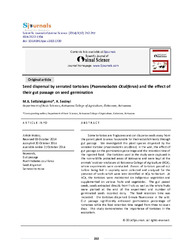Seed dispersal by serrated tortoises (Psammobates Oculiferus) and the effect of their gut passage on seed germination.
Abstract
Some tortoises are frugivores and can disperse seeds away from the parent plant to areas favourable for their establishments through gut passage. We investigated the plant species dispersed by the serrated tortoise (Psammobates oculiferus) in the wild, the effect of gut passage on the germination percentage and the retention time of the ingested food. The tortoises used in the study were captured in the non-wildlife protected areas of Botswana and were kept at the animals’ outdoor enclosure at Botswana College of Agriculture (BCA), where experiments were conducted. Faeces of tortoises passed out before being fed in captivity were collected and analysed for the presence of seeds which were later identified at BCA herbarium. At BCA, the tortoises were maintained on indigenous vegetation and supplemented on various fruits and vegetables. The gut passed seeds, seeds extracted directly from fruits as well as the whole fruits were planted at the end of the experiment and number of germinated seeds recorded daily. The food retention time was recorded. The tortoises dispersed Grewia flavescence in the wild. Gut passage significantly enhanced germination percentage of tomatoes while the food retention time ranged from three to seven days. This study demonstrates the importance of tortoises in the ecosystem.
Collections
- Reseach articles [65]

